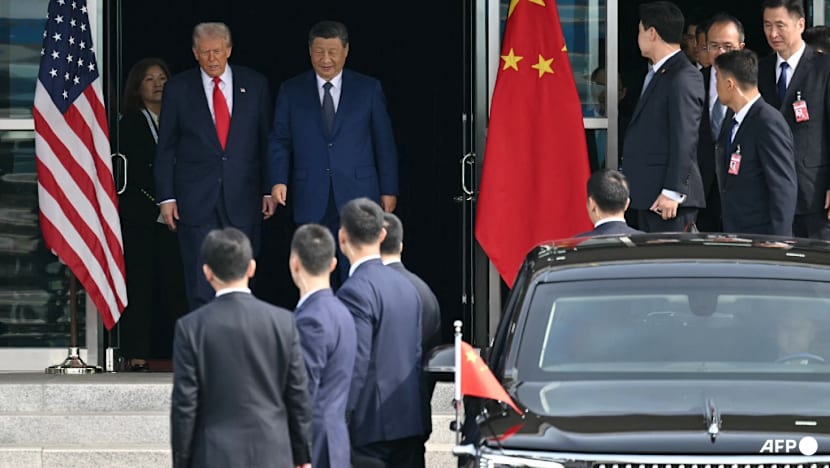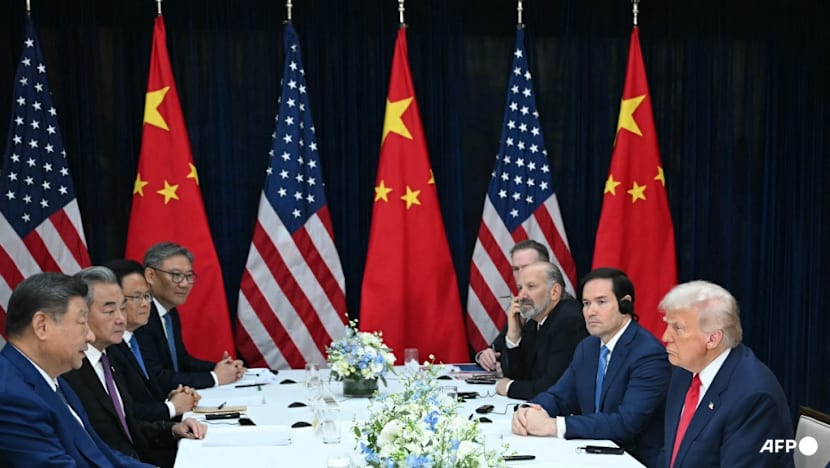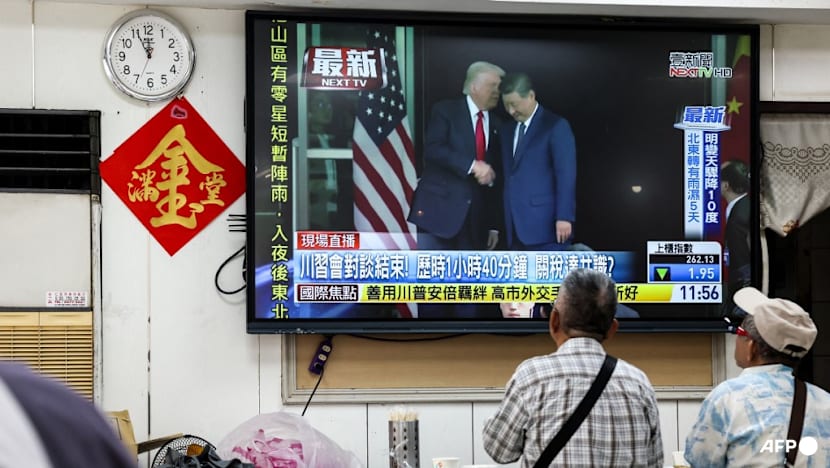BUSAN, South Korea: United States President Donald Trump said on Thursday (Oct 30) he had agreed with President Xi Jinping to trim tariffs on China in exchange for Beijing cracking down on the illicit fentanyl trade, resuming US soybean purchases and keeping rare earths exports flowing.
Trump's face-to-face talks with Xi in the South Korean city of Busan, their first since 2019, marked the finale of a whirlwind Asia trip on which he also touted trade breakthroughs with South Korea, Japan and Southeast Asian nations.
"I thought it was an amazing meeting," Trump said after the talks in Busan, South Korea, praising Xi as a"tremendous leader of a very powerful country".
Trump said tariffs on Chinese imports would be cut to 47 per cent from 57 per cent, by halving to 10 per cent the rate of tariffs related to trade in fentanyl precursor drugs.
Xi will work"very hard to stop the flow" of fentanyl, a deadly synthetic opioid that is the leading cause of American overdose deaths, Trump said.
China agreed to pause export controls unveiled this month on rare earths, elements with vital roles in cars, planes and weapons that have become Beijing's most potent source of leverage in its trade war with the US.
The pause would last for a year, China's commerce ministry said in a statement.
It added that the two sides had also reached consensus on expanding agricultural trade and would work to resolve issues around short video app TikTok, which Trump seeks to bring under US-controlled ownership.
"PARTNERS AND FRIENDS"
“I guess on the scale from 0 to 10, with 10 being the best, I would say the meeting was a 12,” Trump said of his talks with Xi. “I think it was a 12.”
Neither leader made any public comments immediately after the talks, which lasted around an hour and 40 minutes.
Trump headed straight to Air Force One, waving and pumping his fist as he boarded the plane. The jet took off minutes later.
Xi was seen getting into his limousine outside the closed-door meeting.

Xi acknowledged before the meeting began in earnest that both sides did not always see eye to eye, but should strive to be"partners and friends".
"China and the US can jointly shoulder our responsibility as major countries and work together to accomplish more great and concrete things for the good of our two countries and the whole world," said Xi.
Sitting opposite each other, each leader was flanked by senior officials, including Secretary of State Marco Rubio, Treasury chief Scott Bessent and Commerce Secretary Howard Lutnick.
Xi's team, which arrived from Beijing shortly before - the US side was already in South Korea - included Foreign Minister Wang Yi, Commerce Minister Wang Wentao and Vice Premier He Lifeng.

MUTED RESPONSE FROM GLOBAL MARKETS
The reaction to the detente was muted in global stock markets, with major Asian indexes and European futures swinging between gains and losses.
China's Shanghai Composite Index slipped from a 10-year high, while US soybean futures were weaker.
"The response from markets has been cautious in contrast to Trump's enthusiastic characterisation of the meeting," said Besa Deda, chief economist at advisory firm William Buck in Sydney.
Among major US trading partners, only Brazil and India are still subject to higher tariffs.
In the run-up to the meeting, world stock markets from Wall Street to Tokyo had hit records on hopes of a breakthrough in a trade war between the world's two largest economies that has disrupted supply chains and rocked global business confidence.
Trump repeatedly talked up prospects of reaching an agreement with Xi since US negotiators on Sunday said they had agreed to a framework with China to avoid 100 per cent US tariffs on its goods and defer China's export curbs on rare earths.
The cordial meeting between the leaders was held at a South Korean air base on the sidelines of the Asia-Pacific Economic Cooperation (APEC) forum.

FRICTIONS NOW AND THEN ARE NORMAL
"China's development and rejuvenation are not incompatible with President Trump's goal of 'Making America Great Again'," Xi told Trump via a translator at the start of the meeting.
The two sides agreed to pause tit-for-tat port fees on shipping, designed to thwart dominance in shipbuilding, ocean freight and logistics.
China will also begin the process of purchasing US energy, Trump said in a post on Truth Social on Thursday, hinting at a big deal in Alaska where his administration has been touting a proposed US$44-billion LNG pipeline.
The White House has signalled it hopes the summit will be the first of several between the leaders in the coming year. Trump said he would travel to China in April before he receives Xi in the US.
Chinese state media portrayed the meeting with Trump as a triumph of Xi's policymaking.
"We have the confidence and capability to navigate all kinds of risks and challenges," the official news agency, Xinhua, quoted him as saying.
NO NVIDIA CHIP, TAIWAN DISCUSSIONS
The agreement reached broadly returns ties to their status before Trump's"Liberation Day" offensive in April triggered tit-for-tat escalation.
But it may be no more than a fragile truce in a trade war with root causes still unresolved, analysts say.
Trump said he did not discuss Nvidia's state-of-the-art Blackwell chip with Xi, in a further blow to the firm's hopes of maintaining its presence in China's US$50-billion AI market.
The contentious issue of Taiwan, the island claimed by China that is a US partner and high-tech powerhouse, also did not surface in the talks, Trump said.
But minutes before starting the meeting, Trump ordered the US military to resume testing nuclear weapons after a gap of 33 years, pointing to the growing arsenals of Russia and China.

